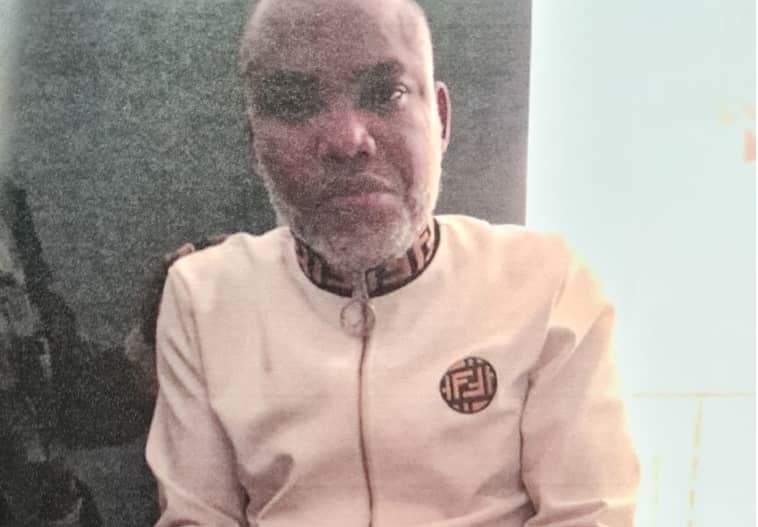The leader of the Indigenous People of Biafra (IPOB), Mazi Nnamdi Kanu, has detailed what he described as the “genesis of his odyssey of injustice,” linking it to his abduction and extraordinary rendition from Kenya in 2021 and a series of alleged violations that followed throughout his prosecution in Nigeria.
Kanu’s brother, Prince Emmanuel Kanu, made his brother’s position known on Thursday after visiting him at the Sokoto Minimum Security Prison.
According to the IPOB leader, his prosecution and conviction were carried out “in clear breach of various sections of both the Nigerian Constitution and international laws,” despite what he described as binding court decisions and legal precedents in his favour.
Kanu questioned how Justice James Omotosho convicted him in spite of earlier judgments from multiple courts, including the Court of Appeal, which had discharged and acquitted him.
He said Justice Omotosho “ignored” these decisions and proceeded to convict him on charges he insists should no longer stand in law.
Detailing the origin of what he called his “odyssey of injustice,” Kanu stated, “My odyssey of injustice commenced with my unlawful rendition from Nairobi, Kenya, on the 19th day of June 2021 — a covert operation of abduction, incommunicado detention, torture, and forcible transfer to Nigeria without extradition proceedings or judicial oversight.”
Advertisement
Kanu argued that the manner of his return to Nigeria has been condemned by multiple courts and international bodies.
He cited the judgment of the Federal High Court in Umuahia delivered by Justice Evelyn Anyadike on October 26, 2022, “This rendition has been unequivocally condemned by multiple authoritative bodies — the Federal High Court, Umuahia, the Honourable Justice Evelyn Anyadike in Nnamdi Kanu v. Federal Republic of Nigeria, suit number FHC/UM/CS/412/2022 delivered on the 26th day of October 2022, which declared it a gross violation of my rights under Sections 35 and 36 of the Constitution and ordered my return to Kenya with N500 million in damages.”
The IPOB leader also recalled securing a favourable judgment at the High Court of Kenya in Nairobi regarding his abduction and extraordinary rendition.
He stated, “The High Court of Kenya at Nairobi per Honourable Justice E.C. Mwita in Nwannekaenyi Nnamdi Okwu Kanu v. Attorney General of Kenya, petition number E123 of 2024 delivered on the 24th day of June 2025, held the abduction, solitary confinement, torture, and denial of basic necessities as unconstitutional violations under the Kenyan Constitution of 2010, awarding KSHS 10,000,000 — approximately N120 million — in general damages against the Kenyan government for its complicity.”
Kanu further argued that Justice Omotosho ignored the findings of the United Nations Working Group on Arbitrary Detention (UNWGAD). According to him, “The United Nations Human Rights Council Working Group on Arbitrary Detention (UNWGAD), in opinion number 25/2022 adopted on the 4th day of April 2022, categorised my detention as arbitrary under Categories I and II, deemed the rendition an extraordinary breach of Articles 3 and 9 of the Universal Declaration of Human Rights (UDHR), Article 9 of the ICCPR, and Principles 2, 4, and 10 of the Body of Principles for the Protection of Persons Under Any Form of Detention or Imprisonment, and recommended immediate release, compensation, and investigation of perpetrators.”
Advertisement
He added that the UN had issued multiple communications through its Special Rapporteurs stating, “Communications from the UN Special Rapporteurs — including on torture, arbitrary detention, forced disappearances, health, minorities, and counterterrorism — in ALNGA 5/2020 (October 2020) and subsequent mandates in October 2021 expressed grave concern over the enforced disappearance from June 19–29, 2021, illegal rendition without judicial process, torture, and ill-treatment, urging Nigeria to provide explanations, cease violations, and comply with its international obligations.”
Kanu also faulted the circumstances of his arraignment in Nigeria, saying, “Compounding this primordial illegality, on the 24th day of June 2021, before Hon. Justice Binta Nyako, I was arraigned without access to counsel of my choice — a flagrant breach of Section 36(6)(c) of the Constitution.”
He said this denial “set the stage for a cascade of nullities culminating in the Supreme Court’s remittal of this matter on the 15th day of December 2023, despite my discharge and acquittal by the Court of Appeal on the 13th day of October 2022.”
Continuing, Kanu argued, “In Appeal No. CA/ABJ/CR/625/2022, we submit with utmost deference that this remittal is a constitutional sacrilege, void ab initio for offending the supremacy of the Constitution and the doctrine of autrefois acquit.”

